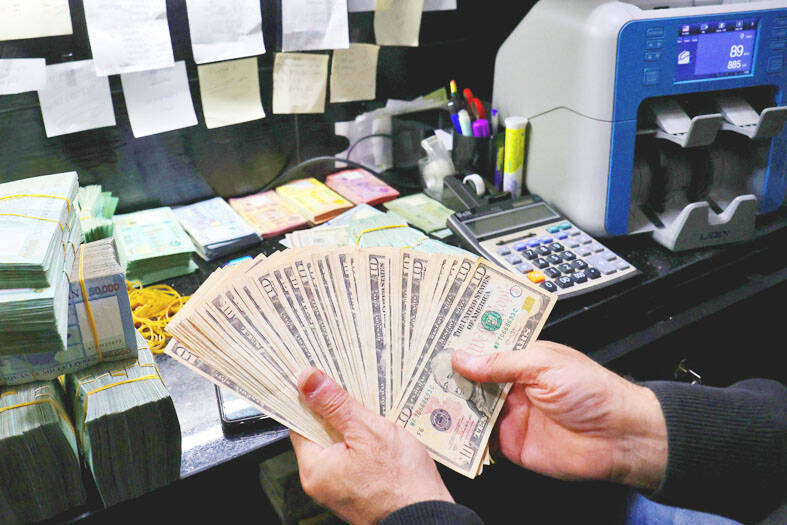The US dollar on Friday fell as further declines in the shares of Credit Suisse Group AG and First Republic Bank rattled markets fearful of contagion and increased concerns that a recession lies ahead because of the effects of tighter monetary policy.
An early recovery in European stocks ran out of steam as investor sentiment remained fragile after a week of turbulence following the failure of Silicon Valley Bank on March 10.
US banks have sought a record US$153 billion in emergency liquidity from the US Federal Reserve in the past few days, while the US$54 billion loan for Credit Suisse and US$30 billion lifeline for First Republic failed to halt their stock declines. Credit Suisse fell 8 percent in Europe and First Republic tumbled 30 percent.

Photo: AFP
The US dollar index, a measure of the dollar against six other currencies, fell 0.53 percent to 103.86, as traders waited for the Fed’s two-day policy meeting that is expected to end with a one-quarter percentage point hike in interest rates on Wednesday next week. The index fell 0.68 percent from the previous week.
Contracts for funds futures showed a 61.3 percent probability that the Fed will raise rates by 25 basis points, the CME Group’s FedWatch Tool showed.
Futures also showed that the Fed would have cut rates by July in a sign recession fears are mounting as the US central bank tightens monetary policy to fight high inflation.
Whether the banking turmoil of the past week leads to an immediate recession is hard to say, said Mazen Issa, senior foreign-exchange strategist at TD Securities in New York.
“It probably increases the probability that you do have a recession and perhaps it increases the probability that you may have a hard-landing scenario, a more severe recession dynamic,” he said.
“Once you have one regional bank go down, households question whether or not the regional banks are in trouble. That’s a natural human emotion to feel,” he said.
The New Taiwan dollar on Friday rose against the US dollar, gaining NT$0.77 to close at NT$30.554, up 0.24 percent from NT$30.848 a week earlier.
The yen fell 1.43 percent to ¥131.83 against the greenback, down 2.35 percent for the week.
Additional reporting by staff writer, with CNA

PATENTS: MediaTek Inc said it would not comment on ongoing legal cases, but does not expect the legal action by Huawei to affect its business operations Smartphone integrated chips designer MediaTek Inc (聯發科) on Friday said that a lawsuit filed by Chinese smartphone brand Huawei Technologies Co (華為) over alleged patent infringements would have little impact on its operations. In an announcement posted on the Taiwan Stock Exchange, MediaTek said that it would not comment on an ongoing legal case. However, the company said that Huawei’s legal action would have little impact on its operations. MediaTek’s statement came after China-based PRIP Research said on Thursday that Huawei filed a lawsuit with a Chinese district court claiming that MediaTek infringed on its patents. The infringement mentioned in the lawsuit likely involved

Taipei is today suspending work, classes and its US$2.4 trillion stock market as Typhoon Gaemi approaches Taiwan with strong winds and heavy rain. The nation is not conducting securities, currency or fixed income trading, statements from its stock and currency exchanges said. Authorities had yesterday issued a warning that the storm could affect people on land and canceled some ship crossings and domestic flights. Taiwan Semiconductor Manufacturing Co (TSMC, 台積電) expects its local chipmaking fabs to maintain normal production, the company said in an e-mailed statement. The main chipmaker for Apple Inc and Nvidia Corp said it has activated routine typhoon alert

GROWTH: TSMC increased its projected revenue growth for this year to more than 25 percent, citing stronger-than-expected demand for AI devices and smartphones The Taiwan Institute of Economic Research (TIER, 台灣經濟研究院) yesterday raised its forecast for Taiwan’s GDP growth this year from 3.29 percent to 3.85 percent, as exports and private investment recovered faster than it predicted three months ago. The Taipei-based think tank also expects that Taiwan would see a 8.19 percent increase in exports this year, better than the 7.55 percent it projected in April, as US technology giants spent more money on artificial intelligence (AI) infrastructure and development. “There will be more AI servers going forward, but it remains to be seen if the momentum would extend to personal computers, smartphones and

Catastrophic computer outages caused by a software update from one company have once again exposed the dangers of global technological dependence on a handful of players, experts said on Friday. A flawed update sent out by the little-known security firm CrowdStrike Holdings Inc brought airlines, TV stations and myriad other aspects of daily life to a standstill. The outages affected companies or individuals that use CrowdStrike on the Microsoft Inc’s Windows platform. When they applied the update, the incompatible software crashed computers into a frozen state known as the “blue screen of death.” “Today CrowdStrike has become a household name, but not in